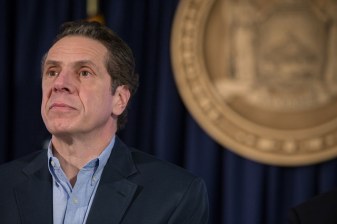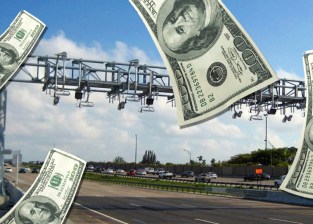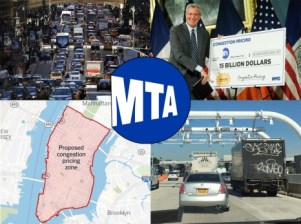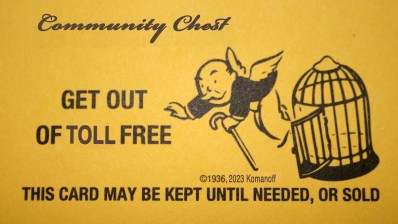The MTA’s Lack of Urgency on Congestion Pricing is Very Unnerving: Advocates
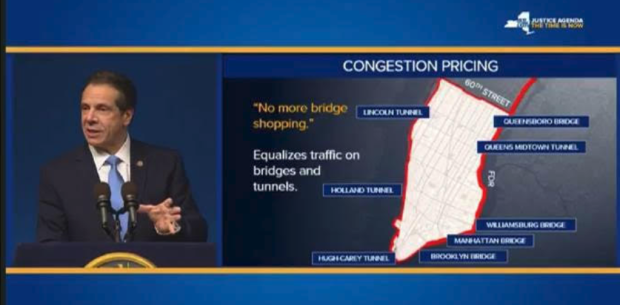
It’s clear! Gov. Cuomo is in no rush to implement congestion pricing.
For two years, the governor had a convenient stalking horse for why congestion pricing wasn’t going anywhere: then-President Trump, who refused to let the MTA begin the required environmental review of the central business tolling. But on March 30, President Biden gave the agency the OK to ink its rubber stamp, which is supposed to take three months.
Yet little has been done since. And in a concerning turn on Wednesday, MTA Chief Financial Officer Bob Foran told the MTA Board that there isn’t a glaring need to get congestion pricing rolling anyway. The agency, he claimed, is not hard up for the literal billion dollars of revenue — bondable to $15 billion! — that congestion pricing would provide for the MTA’s shredded capital program.
“Right now, we’re fronting the capital program with the sales tax monies and the mansion tax monies that we have,” said Foran, referring to much smaller revenue streams. “So we’re not in a position now to really be needing absolutely at this point in time, the congestion pricing proceeds for the capital program.”
Foran went on to say that presumptive incoming CEO Janno Lieber had contracts lined up and ready to go and that the MTA was “looking forward” to getting congestion pricing cash. Additionally, MTA Senior Advisor Ken Lovett tweeted that Foran was referring more to the immediacy around the idea of needing something at a moment in time.
But veterans of the fight for congestion pricing were not amused.
“There’s no reason that preparing the environmental assessment should be taking very much time,” said traffic analyst and activist Charles Komanoff, who’s analyzed and advocated for the benefits of the traffic toll. “The starting gate opened up on March 30, almost three months ago. I’m not saying that there’s no work that has to be done here with the EA, but … that the process could be relatively stripped down.”
Bob Foran was asked with CP not yet in place, can you go forward with capital plan. He basically said right now yes but we’ll need the money down road because it’s a big part of the capital plan.
— ken lovett (@klnynews) June 23, 2021
The governor has been a missing piece in this equation, even as advocates say that the one man who has been compared to the Tom Brady of politics can lead the congestion pricing team to a badly-needed score.
“New Yorkers need a heightened sense of urgency from Gov. Cuomo and his team on this,” said TransitCenter Communications Director Ben Fried. “Traffic is coming back with a vengeance, even though we’re nowhere close to a full [economic] ‘reopening.’ Bus speeds have plummeted since the pandemic peak, when traffic was much lighter. Congestion pricing can turn that around and put the city in a much better position to recover. But if Cuomo’s people just sit on their hands, they’re courting disaster.”
Keeping with the football metaphor, others said that if Andrew Cuomo is the same guy who in 2017 said that congestion pricing was an idea whose time has come, the governor has to find his inner smashmouth game and pound things through the opposition. Besides, this is the same Cuomo-led agency that told the Trump administration that congestion pricing was so beneficial that, in the view of MTA Chairman and CEO Pat Foye, it should have been exempted from the review process altogether.
“Who is the leader for congestion pricing? Who will tell US DOT to … get out of the way and let New York do it for God’s sake. Failure to do that, to have that kind of attitude, is going to set up congestion pricing for years of chaotic entropy-sodden bullshit and ensure that it never happens,” said Komanoff.
For his part, Cuomo appears to be more Ben Simmons than Ben Wallace right now (new sport, sorry), exhibiting an odd passivity on what could be a legacy-defining project that plenty of outer borough lawmakers indeed hope he stalls. And perhaps the governor shares that lethargy; late in 2020, he said that congestion pricing was merely one of many important projects he wanted incoming President Biden to look at, and that he never spoke to him about it. When reached for comment this week, Cuomo’s office referred back to the almost three-month-old statement the governor put out when the federal government permitted the state to do the environmental assessment.
A spokesperson added that the governor wants an as “soon as possible” timeframe for the first-in-the-nation traffic toll, and that the governor is confident the MTA (which he controls) is hard at work.
“[Delay] is not acceptable,” said Riders Alliance Policy and Communications Director Danny Pearlstein. “We need this money yesterday to fix the subway. We need this toll tomorrow to curb pollution and meet our climate goals.”
And, of course, advocates pointed out that the MTA has a huge financial incentive to fund its $54-billion 2020-2024 capital plan.
“We’re a year and a half in to the capital program and we have some time before congestion pricing gets started and the revenues get collected,” said Regional Plan Association Vice President Kate Slevin. “So, you’re looking at two and a half years and more than half the capital program missing a big source of funding in congestion pricing so, to me there’s every financial incentive to advance this as quickly as possible.”
Another advocate suggested the toll was still mired in a black hole, always a comforting thought for a badly needed program.
“It’s possible congestion pricing could remain stuck for several more years in an historical vortex that spans the Trump presidency, the COVID pandemic and the 2022 New York State election,” said Jon Orcutt, a former Bloomberg administration DOT official now with Bike New York.
Pearlstein also pointed out that the current car-heavy recovery on the city’s streets is not a resounding success by any means. Traffic on the MTA’s bridges and tunnels has returned to close to its pre-pandemic levels, even as subway ridership inches up to 50 percent of pre-pandemic numbers and bus ridership hovers around 50 to 60 percent of old ridership levels. As that’s happening, Vision Zero is sliding backwards and the Earth is getting hotter by the day. All of which leaves plenty of good reasons to get congestion pricing done as fast as possible.
“This should not just be a conversation of revenue,” said Cory Epstein, spokesperson for Transportation Alternatives. “There are a boatload of other benefits to congestion pricing from less pollution to faster buses. Any attempt to delay congestion pricing further or minimize its benefits will come at a real cost. Our streets — and our city — need congestion pricing now.”
The MTA did do preliminary work on the environmental review, including sending the Federal Highway Administration a study on how toll prices would influence driver behavior, but publicly at least, little been done: There’s no timetable, although the MTA once submitted documents suggesting the authority could get the study done in three months. Environmental review law expert Michael Gerrard said the MTA’s schedule was aggressive, but achievable — but only if everyone involved worked hard.
The Federal Highway Administration did add one obstacle: a request for “enhanced coordination and public involvement” with the governments of Connecticut and New Jersey because of the potential affects of the toll on residents of those states. But the environmental assessment otherwise follows the same steps as other studies that have been done, involving looking at things like traffic modeling, air quality and economic impacts the toll could have.
Representatives for the Nutmeg State say that they’re aware of what’s going on.
“Connecticut Department of Transportation executive leadership did have a meeting with New York State DOT and MTA, as well as FHWA leadership, several weeks ago,” said CTDOT Spokesman Kevin Nursick. “We were briefed at a high level and we look forward to future discussions during the federal process.”
Even if the enhanced public outreach requirement stretches that schedule, no one involved in the process appears to be pushing publicly to speed things up. MTA officials contend that the agency is working through the process as quickly as it can, including having weekly conversations with federal partners on topics including the scope of public meetings and hearings and how to do things like approach the issue of environmental justice. Authority officials claim that without creating the right form for enhanced public outreach, the federal government might actually say the EA doesn’t pass muster.
But experts say the MTA is needlessly messing around, given that the Biden Administration will likely be friendly to congestion pricing. There’s no reason for the perfect public process to be the enemy of good policy, Komanoff said.
“Sure there will be litigants,” said Komanoff. “There would be litigants in a perfect process, too. The idea that it can possibly be a process that’s going to satisfy the cranks, that’s a joke. The idea that the federal government would put up its hand and slow or stop this thing would be so absurd, because this is so essential for cities, for urban revitalization, and for the present and future of New York City. The MTA shouldn’t be worrying about what the federal government will do. The transit community will take care of that. [Majority Leader Chuck] Schumer, who’s been terrific on this, will take care of the federal government, the whole Congressional delegation will take care of it. And God willing, the governor will take care of it.”
For its part, MTA leadership still won’t talk about whether they think the traffic toll that was supposed to have started in January 2021 will be delayed by either one year (which Lieber suggested in July 2020) or two years (which the MTA suggested in a financial disclosure form at the end of 2020).
“We have 15 billion reasons to have congestion pricing absolutely as quickly as we can,” Foye said on Wednesday, in reference to the money the MTA can bond out for the capital plan with congestion pricing revenue. “The team here is working to move it along, but I’m not going to pick a day out of the air for it. But we’re working as hard as we can every day to advance it.”
But congestion pricing proponents say that the MTA has to move with urgency of Ghostface Killah screaming at himself to beat the clock.
“We can’t afford to wait till early 2023, because the reality is, if they wait that long and it gets tied up in litigation once it’s supposed to start, it very well may not be in effect until 2024 anyway. So the MTA should be aiming for the earliest conceivable date because they don’t realistically know yet when the first tolls will be collected and the urgency could not be greater,” Pearlstein said.
